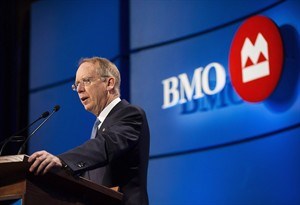
Bill Downe, CEO of BMO Financial Group, speaks at the company's annual meeting in Toronto on April 1, 2014. Canadian banks are taking a hard look at their energy and consumer loans as they brace for the possibility of a prolonged period of depressed oil prices. THE CANADIAN PRESS/Michelle Siu
Republished January 14, 2015 - 12:50 PM
Original Publication Date January 14, 2015 - 7:30 AM
TORONTO - Canadian banks are taking a hard look at their energy and consumer loans as they brace for the possibility of a prolonged period of depressed oil prices.
The chief executive of Royal Bank of Canada (TSX:RY) said RBC will begin testing its $9.6-billion portfolio of energy-related loans to see how it will perform if oil prices remain around US$45 a barrel for an extended time.
Dave McKay says Canada's largest commercial bank has already tested how the portfolio would fare if oil prices hovered around $60 per barrel and is comfortable with the results. But, given the continued drop in oil prices, the bank will be retesting for $45 a barrel, McKay told a conference of Canadian bank CEOs on Wednesday.
Chief executive Bill Downe says the Bank of Montreal (TSX:BMO) has tested its $5.9 billion portfolio of oil and gas-related loans — which makes up roughly two per cent of the bank's total loan book — to see how it will perform in a scenario where oil drops to $35 a barrel.
"We have looked at the portfolio even in a scenario of $35 a barrel WTI this year, and $50 barrel WTI next year, which I think is consistent with the most difficult downside scenario you can find in the last 50 years," Downe said.
Even in such a situation, Downe says losses to the bank would be "very, very manageable — in fact they're quite small relative to the overall size of the bank balance sheet."
Canada's top lenders are also monitoring their portfolios of consumer loans in Western Canada, including credit cards and mortgages, which could be at risk if the drop in oil prices leads to widespread job losses.
The price of oil has been cut in half over the past six months and traded in recent days at its lowest levels since the spring of 2009.
Suncor, one of Canada's largest energy companies, said Tuesday it was cutting 1,000 jobs — mostly employees of contractors — and reducing its capital budget by $1 billion due to the drop in oil prices. The move followed an announcement last week by Shell Canada that it was cutting its workforce at its Albian Sands oilsands operation.
Downe says 20 per cent of BMO's consumer loans are in the West, and he expects to see an increased number of customers who are unable to pay their credit card and mortgage debts, although the change is likely still a quarter away.
The loan losses could extend beyond Alberta as well, said CIBC (TSX:CM) chief executive Victor Dodig.
"The question now is: how much of this is going to be contained more locally and how much of it will ripple through the rest of the country?" Dodig said.
The bank executives say they are also concerned about the possibility that plummeting energy prices will lead to a slowdown in the Canadian economy that will hamper their growth prospects, particularly in the personal loans business.
"The bigger story, if there is going to be a story, is if this is a sustained period where prices of oil go lower than where they are, what happens to growth?" said Bharat Masrani, the chief executive of Toronto-Dominion Bank (TSX:TD). "What happens to consumer sentiment in that part of the world?"
While the banks were already expecting consumer borrowing in Canada to slow, Downe says the impact will be even greater than anticipated in 2015 and 2016.
However, McKay said RBC expects to reap some benefits from the lower oil price, as well. He predicts the bank's commercial lending business in Ontario — Canada's most populous province — will see higher revenues, as the weaker loonie boosts exports to the U.S. and leads to growth in that part of the country.
RBC also expects lower oil prices will boost economic conditions in the Caribbean — a region that is a net importer of oil — and will aid RBC's businesses there.
News from © The Canadian Press, 2015